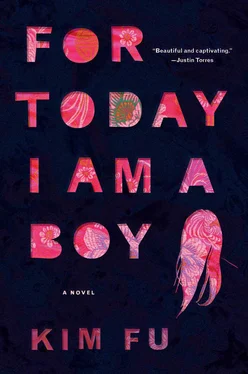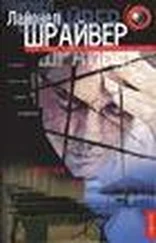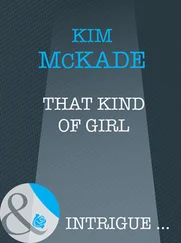Helen, sitting on the floor between unpacked boxes in her new apartment, crossed her splayed legs. She dignified her posture as though being watched. I could imagine all of this, even the monstrous shadows of unarranged furniture, a pile of lamps on a couch like severed heads. Her voice became measured, business as usual. “I’m just having a bad day,” she said. “Sorry to alarm you. A visit would be nice, but I’m very busy getting set up here.” She had expected a silent, furious auditor, an abstract ma-ma —the way our mother used to be. She would’ve been as surprised as I was by the Ha!
“Busy? How much stuff could you have, what do you have to do? Just a young single girl.”
Helen, forty years old, didn’t comment on that.
“You wake me up crying and expect me not to visit? My favorite child? Ha!”
Helen resisted the urge to say That’s news to me. Her instinct to bargain kicked in. “I’ll buy you a bus ticket,” she said, thinking she could wear my mother down.
“Great!” Mother said. “I want to go next week.”
Who is this woman, Helen thought.
The bus pulled up to the border crossing just north of Buffalo, New York, shortly after midnight. It had weaved all afternoon through Ontario, and as the lights went on, a babel of tired voices tittered in German, French, Italian, Farsi, and Mandarin. The mix of languages reminded Mother of an orchestra tuning up. They passed from the overwarm bus to the overwarm Customs building with only a brief reprieve of cool night in between.
My mother wore sneakers and black dress pants that she had hemmed too short. Hers was the only bus being processed, and there were nearly as many agents as passengers. A middle-aged couple stood in line in front of my mother. They were huddled and stooped as though they were much older. The woman spoke frantically in Italian to her husband, gripping her headscarf, and the man shushed her with a backward motion of his hand.
My mother was called up. The agent at the counter was a young man with a military haircut and muscular shoulders, though his gut pushed his belt down to his hips. His last name was sewn into his vest: Sosa. Like the baseball player, Mother thought. He swung his chair sideways, away from her, as he squinted at her passport photo. “So where you going?”
“Washington, DC.”
“Uh-huh. And what’s there?”
“My daughter.”
He glanced at my mother then. An image flashed through Mother’s mind, an image from when she was in primary school. The students had to stand at attention whenever they were asked a question. She remembered how, after you’d given the answer but before the teacher began her ritual of humiliation, before the ruler came down on your knuckles, you just knew, from the quality of the silence, what was coming.
“I see. And what’s her visa status there? Does she have a green card?”
“Yes. I think so. Yes.” The poster on the wall behind the border agent had three smiling young white people with their arms crossed, standing in front of an American flag. We are the face of the United States of America, it said. We welcome you to our country.
“You coming from China, ma’am?”
Mother glanced at her Canadian passport. The agent flipped it absent-mindedly between his middle and index fingers. “No. I’m Canadian. I’ve lived there for more than forty years.”
The agent started typing something swiftly into his terminal. The old keyboard clacked as it sprang back against his fingers. “Forty years is a long time to keep that accent. May I see your return ticket to Canada, ma’am? ”
“I don’t have one.” He stopped typing. “My daughter is going to buy me a plane ticket home.”
“How long are you staying?”
“Until she feels better.”
“Is she sick?”
“She’s…” My mother strained after the word. Her accent had gotten worse since he had mentioned it. “She’s… sad.”
“Uh-huh.” His victorious, almost private smile seemed familiar to Mother. “I’m going to have to deny you entry, ma’am.”
“Why?”
A few windows over, an agent screamed, “I don’t speak any fucking Italian!”
Sosa’s eyes flitted left and then returned to Mother, unaffected. “Because you don’t have a return ticket or an expected date of return. That counts as trying to immigrate without a visa.” The agent spoke in a calm voice, one you could use to hypnotize an animal. Mother couldn’t account for the rage that was building up inside of her.
“Isn’t anyone going to do anything about that?” she said.
“About what?”
She gestured toward the agent who had screamed. “What she just said to those poor people.”
He continued typing. “Would you like to file a complaint?”
“Yes!”
“You’ll have to go to the Canadian consulate and provide an incident report. About something someone said to someone else.” He stood up. “Now, I’m going to tell your bus driver that we’re detaining you. Do you have a cell phone?”
The voice, the smile. It was my father. Mother saw him standing there now, in this agent’s uniform, one hand on his pistol, running her life with a light touch, being so goddamned reasonable, never raising his voice or his hand. She wouldn’t let another one tell her what to do. Another one of these men who make all the decisions, strip you of autonomy and disguise it as kindness.
“I don’t want to live in your stupid country,” she said, her accent worse than ever. “I have a house in Canada. I have children there. But one of my stupid children chose to move down there and she needs me!”
Still smiling. This, too, was familiar: hearing herself scream at a brick wall. “Are you yelling at me, ma’am?” he asked. As though it were a legitimate question and not a trick you use to patronize children.
“No.”
“Put your bag up here, please.”
He unzipped her small suitcase slowly, as you might undo a lover’s coat. The way Father drew out a punishment. He picked through her underwear piece by piece, with the long line of her fellow passengers behind her. He went through her pockets. He held the clouded sandwich bag with her toothbrush inside up to the light. Everyone was watching them now. She heard someone ask, “What’s happening?”
“May I see your arms?” he asked loudly.
Uncomprehending, she held out her arms.
“Roll up your sleeves past the elbow.”
“Why?”
“Please do as I asked, ma’am.”
Mother started to tremble. She had loved my father once. Loved his quiet authority, his impeccably shined shoes, the way he would order for her at restaurants and guide her by the small of her back. She had pitied other women her own age, with their husbands who drank, who were needy as babies and violent as teenage boys. She’d married a leader, a king. When he died, she’d felt abandoned, overwhelmed by the smallest choices.
One morning, she found herself staring at the carpet in the living room. How she hated it. The white that had turned to sooty gray almost immediately, stained by four drooling children and four careless teenagers, how much of her life had been spent vacuuming and scrubbing this ugly, impractical thing. She saw it gone. She touched her hair, still kept girlishly long, as Father had liked it, even though it was too thin and brittle to wind into a bun anymore. She saw it gone. An exposed neck, exposed floors, everything lean and light. She could eat whatever she wanted, go wherever she wanted, call old friends. She didn’t need to ask permission and try to work out his web of leading, trapping questions.
She kept her eyes lowered as she rolled up the sleeves of her shirt. The agent examined the crooks of her elbows. She wanted to grab his pistol. No more. No more.
Читать дальше












